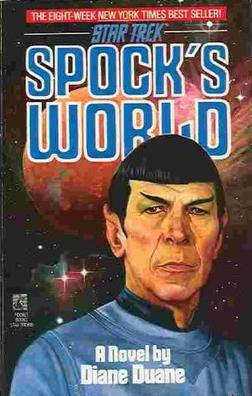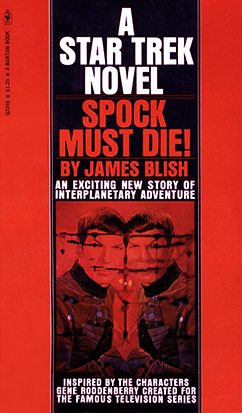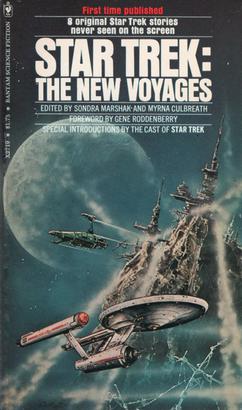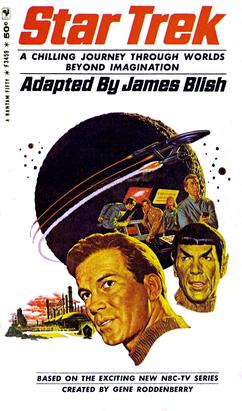Related Research Articles

Vulcans, sometimes referred to as Vulcanians, are a fictional extraterrestrial humanoid species in the Star Trek universe and media franchise. In the various Star Trek television series and films, they are noted for their attempt to live by logic and reason with as little interference from emotion as possible. Known for their pronounced eyebrows and pointed ears, they originate from the fictional planet Vulcan. In the Star Trek universe, they were the first extraterrestrial species to make contact with humans.

Spock is a fictional character in the Star Trek media franchise. He first appeared in the original Star Trek series serving aboard the starship USS Enterprise as science officer and first officer and later as commanding officer of the vessel. Spock's mixed human-Vulcan heritage serves as an important plot element in many of the character's appearances. Along with Captain James T. Kirk and Dr. Leonard "Bones" McCoy, he is one of the three central characters in the original Star Trek series and its films. After retiring from active duty in Starfleet, Spock served as a Federation ambassador, and later became involved in the ill-fated attempt to save Romulus from a supernova, leading him to live out the rest of his life in a parallel universe.
Slash fiction is a genre of fan fiction that focuses on romantic or sexual relationships between fictional characters of the same sex. While the term "slash" originally referred only to stories in which male characters are involved in an explicit sexual relationship as a primary plot element, it is now also used to refer to any fan story containing a romantic pairing between same-sex characters. Many fans distinguish slash with female characters as a separate genre, commonly referred to as femslash.

Saavik is a fictional character in the Star Trek universe. She first appeared in the film Star Trek II: The Wrath of Khan (1982) played by Kirstie Alley. Robin Curtis took over the role for Star Trek III: The Search for Spock (1984) and Star Trek IV: The Voyage Home (1986).

"Amok Time" is the second season premiere episode of the American science fiction television series Star Trek. Written by science fiction author Theodore Sturgeon, scored by Gerald Fried, and directed by Joseph Pevney, it first aired on September 15, 1967.

"Spock's Brain" is the third season premiere episode of the American science fiction television series Star Trek. Written by Gene L. Coon and directed by Marc Daniels, it was first broadcast on September 20, 1968.
"Yesteryear" is the second episode of the first season of the animated American science fiction television series Star Trek. It first aired in the NBC Saturday morning lineup on September 15, 1973, and was written by veteran Star Trek writer D. C. Fontana. Widely regarded as one of the best episodes of the series, it was nominated for a Daytime Emmy Award. "Yesteryear" guest-starred Mark Lenard in the role of Spock's father, Sarek.
"The Infinite Vulcan" is the seventh episode of the first season of the American animated science fiction television series Star Trek: The Animated Series. It first aired on NBC on October 20, 1973, and was written by Original Series cast member Walter Koenig. It was the actor's only involvement in the series, as he had not been hired to voice Pavel Chekov in the animated version due to budgetary limitations. With "The Infinite Vulcan", Koenig became the first member of the Star Trek cast to write an episode for the franchise. As with the rest of the first season, the episode was directed by Hal Sutherland.

Kirk/Spock, commonly abbreviated as K/S or Spirk and referring to James T. Kirk and Spock from Star Trek, is a popular pair in slash fiction, possibly the first slash pairing, according to Henry Jenkins, an early slash fiction scholar. Early in the history of Star Trek fan fiction, a few fan writers started writing about a romantic and sexual relationship between Kirk and Spock, highlighting a romantic or sexual element to the friendship between the men. As of 1998, most academic studies on slash fiction focused on Kirk/Spock, as Star Trek was by that point one of the longest-lived and most prosperous subjects of slash fiction, while its mainstream popularity made it one of the most accessible titles for academics and their audience. As the first slash pairing, K/S was created and developed largely independently from the influence of other slash fiction, with most of the conventions of the slash genre seeing their debut first in K/S slash.

Spock's World is a 1988 science fiction novel by American writer Diane Duane, set in the fictional Star Trek universe. The plot revolves around a movement on the planet Vulcan to secede from the United Federation of Planets. The book alternates chapters that advance the main plotline with chapters that relate important scenes from Vulcan's history, and much of the book explores underlying themes in Vulcan philosophy and culture, especially the idea of cthia, a Vulcan philosophical concept translated in the book as "reality-truth — seeing things the way they really are, instead of the way we would like to see them".

Spock Must Die! is an American science fiction novel written by James Blish, published February 1970 by Bantam Books. It was the first original novel based on the Star Trek television series intended for adult readers. It was preceded by a tie-in comic book line published by Gold Key and the novel Mission to Horatius by Mack Reynolds, all intended for younger readers.

Star Trek: The New Voyages (1976) is an anthology of short fiction based on Star Trek, edited by Sondra Marshak and Myrna Culbreath. Although published professionally, the collected stories were written and submitted by fans. Many of the stories were previously published in fanzines, or collected in fan-published anthologies. The New Voyages was commissioned by Frederik Pohl following his acquisition of Star Trek Lives!, which featured essays on the growing Star Trek fandom, and a chapter on Star Trek fan fiction.

The Price of the Phoenix is a science fiction novel by American writers Sondra Marshak and Myrna Culbreath, based upon the 1960s television series Star Trek. It was first published by Bantam Books in 1977, and reissued by Corgi and Titan Books in the UK.

In 1966, Bantam Books acquired the license to publish tie-in fiction based on the science fiction television series Star Trek.

Killing Time is a science fiction novel by American writer Della Van Hise. Part of the Star Trek: The Original Series franchise, it was published by Pocket Books in 1985. The original manuscript had Kirk/Spock slash fiction elements, and these were requested to be removed by Paramount. However, they were not removed, and 250,000 copies were printed. These romantic undertones between Spock and James T. Kirk were brought to the attention of the office of the creator of Star Trek, Gene Roddenberry, who made Pocket Books recall the first edition. This edition subsequently became a collector's item, with more than fifty changes made to a revised version.
A Mary Sue is a character archetype in fiction, usually a young woman, who is often portrayed as inexplicably competent across all domains, gifted with unique talents or powers, liked or respected by most other characters, unrealistically free of weaknesses, extremely attractive, innately virtuous, and/or generally lacking meaningful character flaws. Usually female and almost always the main character, a Mary Sue is often an author's idealized self-insertion, and may serve as a form of wish fulfillment. Mary Sue stories are often written by adolescent authors.
Sondra Marshak is an American science-fiction writer. She is most well known for her work co-written with Myrna Culbreath. She was a co-writer of Star Trek Lives! (1975), with Jacqueline Lichtenberg, and television producer Joan Winston. She was an early promoter of Star Trek fan culture, and a publisher of fan fiction.
Myrna Lou Culbreath is an American science fiction writer and editor, most well known for the Star Trek tie-in novels and anthologies cowritten with Sondra Marshak. Culbreath was a founding editor of the libertarian editorial magazine The Fire Bringer.

Star Trek Lives! is a 1975 book, co-written by Jacqueline Lichtenberg, Sondra Marshak, and Joan Winston, which explored the relationship between the Star Trek television series and the fandom that emerged following the series' cancellation. It was published by Bantam Books.
References
- ↑ Spock's Affirmation, entire text online at simegen.com, page found 2010-05-09.
- ↑ Bacon-Smith, Camille, "Spock Among the Women". New York Times, November 16, 1986, specifically mentions Kraith and its "story tree" collaborations among amateur writers.
- ↑ Bacon-Smith, Camille, Enterprising Women, Television Fandom and the Creation of Popular Myth (University of Pennsylvania Press, 1992). Expansion of her New York Times article. Has a more detailed look at Kraith "story-tree" collaborations, in the context of examining whether or not women write fiction differently from men.
- ↑ Jewett, Robert, The American Monomyth. New York: Doubleday, 1977.
- ↑ Verba, Joan-Marie, Boldly Writing, a Trekker Fan and Zine History, 1967-1987. FTL Publications, second edition, 2003.
- ↑ Reid, Sean, Between the Worlds: Readings in Contemporary Neopaganism. Canadian Scholars' Press, 2006.
- ↑ Ashley, Michael, Gateways to Forever: The Story of the Science-Fiction Magazines. Liverpool University Press, 2007.
- ↑ David Gerrold discusses this aspect of Star Trek in his book The World of Star Trek (Ballantine, 1973).
- ↑ Lichtenberg, Jacqueline, Federation Centennial , chapter 3. Page found 2010-05-02.
- ↑ Lichtenberg, "Author's Preface", Kraith Collected, p. 4.
- ↑ In the "Author's Preface" to Kraith Collected I, p. 3, she explains the necessity of "gently introducing" readers to her ideas over a multi-story series: "The concepts are radical and very strange. Not one in five hundred would be able to accept them."